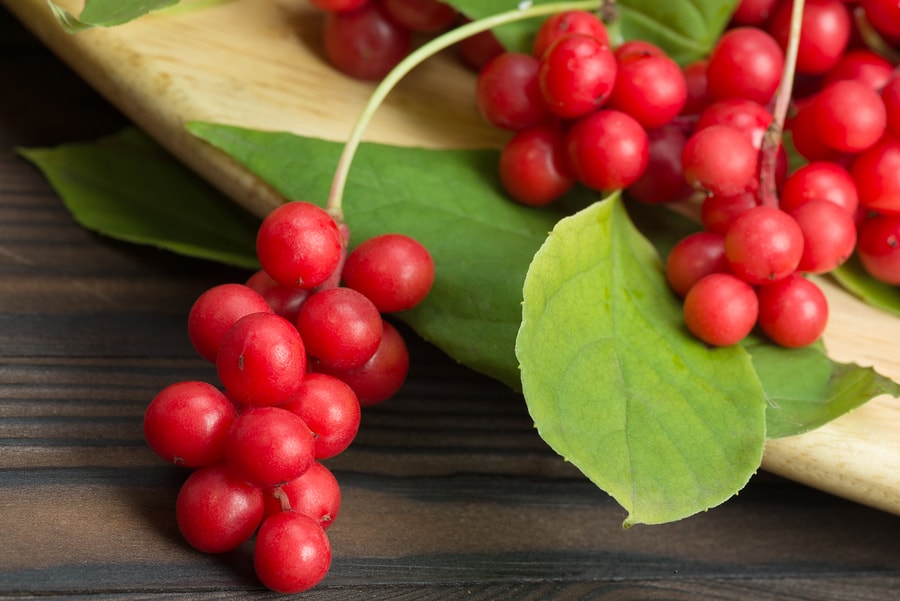
Schisandra is an adaptogen that may support cognition and liver health, improve physical performance, and more. However, clinical research on this Chinese herb is scarce. In this post, we reveal the benefits of Schisandra and warn about potential side effects.
What is Schisandra?
Schisandra also referred to as Schizandra or Schisandra Chinensis comes from a vine native to China and parts of Russia. Its berry is used as a form of traditional Chinese medicine.
Schisandra fruit is also known as the Five Flavor Berry because its taste captures the five major favors – sour, sweet, salty, bitter, and spicy [1].
This wholesome and exotic berry is categorized as an adaptogen, meaning it helps prevent physical and chemical stress on the body. When consumed, it accumulates in the heart, brain, kidneys, lungs, and liver tissues [2].
Schisandra is traditionally used as a performance enhancer and a treatment for various illnesses. The antioxidants in this fruit may be responsible for its health effects [1].
Snapshot
Proponents:
- Improves liver function
- Supports cognition
- May improve physical performance
- May protect the lung and heart
Skeptics:
- Most benefits lack clinical evidence
- Not well studied in humans
- Not recommended for people who have acid reflux (GERD) or ulcers.
- Potentially dangerous for women who are pregnant or nursing
Health Benefits of Schisandra
Possibly Effective:
1) Liver Function
Schisandra is traditionally used to treat liver diseases such as hepatitis and improve liver function.
In 45 patients with impaired liver function, a combination of Schisandra extract and sesamin [3]:
- Reduced liver enzymes
- Boosted glutathione
- Suppressed oxidative damage and inflammation
- Improved fatty liver
Schisandra antioxidants are mainly responsible for these effects. They help maintain liver function while preventing damage [4].
In Japanese herbal medicine, a mixture of herbal extracts TJ-108 is used to treat hepatitis C. Schisandra extract seems to be the key ingredient in this mixture [5].
In different animal studies, scientists observed the potential of schisandra extract and schisandrin B to improve non-alcoholic fatty liver disease (NAFLD) and alcohol-induced liver damage [6, 7, 8, 9].
2) Cognitive Support
A single dose of an herbal preparation containing Schisandra improved attention, cognition, and accuracy in 40 healthy women under stress [10].
Deoxyschizandrin and schisandring, components from Schizandra extract, reversed memory impairment in different animal trials. They were able to prevent degenerative changes in the brain as seen in Alzheimer’s disease and brain aging [11, 12, 13, 14].
Insufficient Evidence:
No valid clinical evidence supports the use of schisandra for any of the conditions in this section. Below is a summary of up-to-date animal studies, cell-based research, or low-quality clinical trials which should spark further investigation. However, you shouldn’t interpret them as supportive of any health benefit.
3) Lung Health
Supplements containing Schisandra extract are traditionally used to treat a cough and asthma.
In 60 pneumonia patients, a product containing rhodiola, schisandra, and Siberian ginseng (ADAPT-232) reduced the duration of antibiotic treatment and improved quality of life, compared to standard treatment alone [15].
Further studies should examine the potential benefits of Schisandra for lung function.
4) Physical Performance
Schisandra may increase nitric oxide levels in athletes, potentially improving their performance [16].
In rats and mice, Schisandra improved exercise performance and endurance by helping the animals adapt to stress (adaptogen) [17, 18].
5) Heart Health
Schisandra increased blood flow and nitric oxide availability in two smaller clinical trials, which might protect the heart and blood vessels in theory [19, 16].
However, no clinical studies have investigated the effects of Schisandra on heart health.
Sheng-Mai-San, a supplement containing Schisandra fruit extract, is used to treat heart disease in Chinese traditional medicine [20].
In experiments on rat heart, schisandrin B was able to protect heart tissue and prevent heart damage [21].
Animal and Cellular Research (Lacking Evidence)
No clinical evidence supports the use of schisandra for any of the conditions listed in this section. Below is a summary of the existing animal and cell-based studies. They should guide further investigational efforts but should not be interpreted as supportive of any health benefit.
Anxiety and Insomnia
Schisandra reduced corticosterone (animal version of cortisol), the stress hormone, in rats [11].
In rats and mice, a small dosage promoted calmness and relaxation and improved sleep quality [22].
According to research on animals, schisandra may help control the changes in adrenaline and serotonin levels caused by stress. combat “adrenal fatigue” linked to stress, and reduce anxiety [23, 24].
Schisandra Side Effects and Precautions
Keep in mind that the safety profile of Schisandra is relatively unknown, given the lack of well-designed clinical studies. The list of side effects below is not a definite one, and you should consult your doctor about other potential side effects, based on your health condition and possible drug or supplement interactions.
Schisandra is possibly safe when taken short-term in appropriate amounts. It may cause mild side effects such as [25]:
- Heartburn
- Indigestion
- Reduced appetite
Schisandra is not recommended for people who have gastroesophageal reflux disease, epilepsy, and peptic ulcers. It is also not recommended for women who are pregnant or nursing [25].


